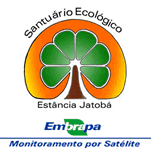

 |

|
|
Home |
Project |
History |
Localization |
Perception |
Publications |
Maps |
WebGIS |
Team |
|
 |
PERCEPTIONPERCEPTION >> PHILOSOPHY AND CHOICES
The Project Estância Jatobá, conceived of as a not-for-profit education and research activity, is devoted to the study and promotion of human well-being, nature conservation and sustainable food systems. It is an individual citizen effort to understand and foster living well in a place. The project features learning through direct experience, using local empirical knowledge as well as scientific research to understand and improve self-knowing, human relations, nature conservation, sustainable cultivation, waste management and efficient and clean energy use. In addition, it includes refining esthetic sensibilities through artistic expression and constructive imagination. Such activities are not restricted to constructing objects of art. Significant learning and guidance may be achieved by using the German savant J.W. von Goethe's scientific method. That is, by using a phenomenology that allows the ecosystem to "tell" us what it intends, what it needs, what it means. Goethe explained "That which has been formed is immediately transformed again, and if we would attain in some measure a living comprehension of nature, we must ourselves remain as mobile and plastic as the example nature presents us." Changing people's perceptions of nature through behavioral manipulations or marketing slogans( brain-washing) is not the aim of an "environmental psychology" that might be applied here. Rather, it involves the incorporation of our own values, thoughts, perceptions, spontaneous emotional reactions as an inseparable part of the ecosystem - which we ourselves, in fact, are. By not denying our contribution to and the influence we exert on this phenomenon is likely to open avenues of direct perception of the watershed as an organism and its most obvious attribute, the genius loci (the spirit of the place). This should be our guide for appreciation, protection, and if necessary, intervention. By approaching what the American prairie-researcher Wes Jackson has called, "becoming native to this place," it becomes home, farm, campus, laboratory, museum, and nature sanctuary. Except for respect for individual spirituality, the project follows no organized religious orientation. Beyond a sensible concern and promotion of healthy human relationships and a just society, no particular doctrine of "community" is favored. A desire for a natural reserve integrated with an ecologically sound sustainable food and agriculture system that is socially responsible and economically efficient is sufficient intention. Beauty, artistic and cultural endeavors that provide esthetic nourishment as well as clarify the human role in nature are an integral element. Special attention is given to how this place produces nutrients that include not only food but also knowledge, and hopeful enthusiasm. How "wellness" is related to this ecosystem is being studied. Efforts are being made to eliminate waste and pollution, use solar energy for efficiency and to reduce greenhouse gases, preserve groundwater, conserve soils, manage renewable resources for the long run, safeguard human health, reverse the depletion of forests and wetlands and increase carbon storage. Another of Goethe's advice is being trusted. "Whatever you can do, or dream you can, begin it. Boldness has genius, power, and magic in it." |